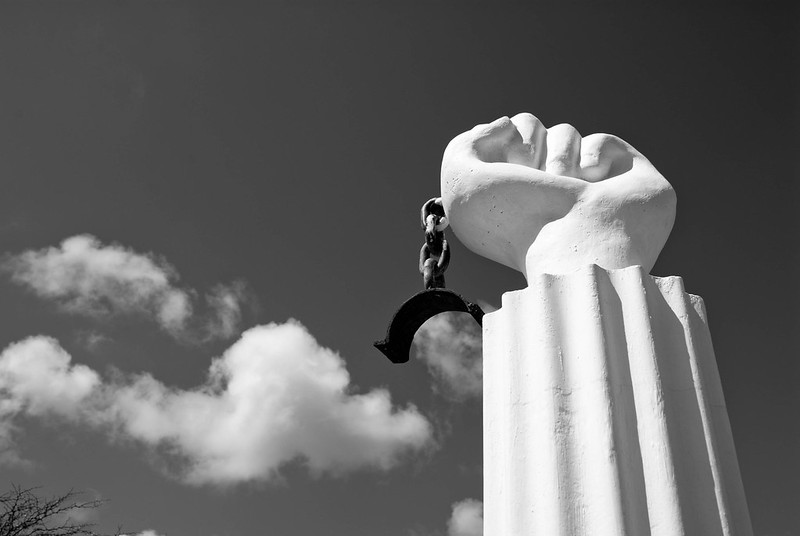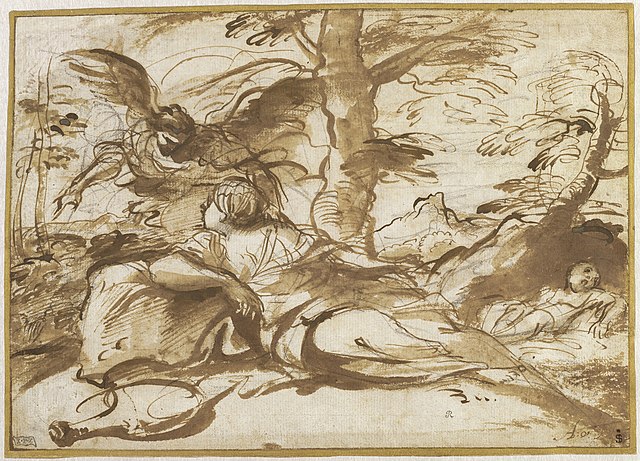
The Limits of Black Theology
Black theology has often been made equivalent to black liberation theology. It is perhaps this overdetermination by a sense of liberation that is characterized by a Christian redemptionist account of freedom that can create both a sense of disjointedness between black theology and black studies, and a critical point of engagement. In a recent essay, I noted how Cedric Robinson identifies a homology between a Christian redemptionist paradigm and the political paradigm of the West. While the modern political order aims to repress its mythical foundations, equating the mythic with the primitive as a way of obfuscating its origins, Robinson shows how the combination of the mythic and the scientific provides the foundation for Western assumptions of order. What is so crucial about Robinson’s recognition for developing a decolonial account of black liberation theology is that it makes explicit how the theological paradigm of redemption coincides with the political illegitimacy of black people in the West.
It is an open question as to what can be done with black liberation theology, but taking Robinson’s work seriously requires a close engagement with the question of redemption in black theology. While black liberation theology maintains a steady influence, particularly in providing a critical announcement of God’s siding with black people against white oppression, it also remains the site of critique for its masculinism, its overdetermination by Christianity, and its seeming support of redemptive suffering. Developing theological approaches in conversation with black studies requires a refusal of orthodox Christian theological assumptions of confession at the outset, which, too often, can impose a narrative order on an existential and epistemological situation that is precisely a rupture within Christian order. At the same time, such inquiry must also demand a refusal of secularism’s orthodoxies and the cordoning of the theological to the private sphere. What I consider here are the possibilities of understanding black theology in terms of a black tradition of historical materialism set out by scholars like Cedric Robinson and Sylvia Wynter. Such an approach requires an embrace of the heretical and the heterodox as a means of liberating the black theological imagination from Christian order.
Historical Materialism and the Black Radical Tradition
A recent essay by Matthew Harris and Tyler Davis on James Cone and the Third World is a helpful example of the usefulness of a historical materialist framework for an engagement with black theology. Refusing to cast James Cone in terms that cohere with Christian orthodoxy or subject him to a pragmatic critique of black nationalism which is beholden to the American democratic project, the two provide a view of Cone’s relationship to Third World theologians and critiques that enable a resituation of his work. Here, coming to terms with the limits of black liberation theology doesn’t require it’s supersession so much as its rereading in otherwise terms. It also encourages dehiscence–the immanent splitting or rupturing of its thought and spreading of contents in unforeseen and disordered ways.
Similarly, refusing to excise the theological from black radical thought would go a long way toward resolving the anxiety around religion, spirituality, and the mythic in historical materialist circles. For instance, there is sometimes a Marxist-Leninist critique of Cedric Robinson’s Black Marxism that posits a “cultural-metaphysical Black Radical tradition” as inadequate to contending with racial capitalism as opposed to “antiracist socialism.” Because Robinson never shies away from mystical elements of the black radical tradition, critiques of him sometimes rest on the desire to expel these elements from his analysis. But it is precisely his understanding of these mystical and mythic elements of the tradition, not as signs of a primitivism, but as key elements of the historical material mode of refusal and resistance to racial capitalism that makes it so insightful. Rather than seeing black religiosity and black theological production as at odds with historical materialism, we, following Robinson, might see them as ways into the historical struggle over the matters of authority and order. As Avery Gordon’s preface to Robinson’s Anthropology of Marxism notes:
The socialist tradition that Robinson uncovers and which finds its exemplar in medieval heretical radicalism was indeed more than an opposition to capitalist exploitation. It issued a morally authoritative analysis of the corrosive abuse of power, the indignities of unrelieved poverty, and the sacrificial value of private property ownership. It had a ‘consciousness of female liberation,’ of popular democracy, and of the inhumanity of slavery and ‘imperialist excess.’ (xxii-xxiii)
Here, Robinson’s historical materialism leads him to the heretical histories that are repressed in the Christian and secular production of knowledge and governance. Taking seriously the material of these histories, a key element of Robinson’s analysis is grounded on the heretical political theological material that provides the foundations for socialist struggle. Thus, Robinson’s attention to this material provides both a recognition of the mixed paradigm of the mythic and the scientific that undergirds Western claims of order, while it also sheds light on the theological as part of the historical material of heretical resistance to hierarchical and racializing authority. For instance, he notes “the religious or pious women” who lived “on the margins between dualistic heresies and the mendicant orders.” “Sometimes as nuns . . . , sometimes as lay mystics . . . , and sometimes as heretics . . . , they appropriated the vita apostolica with a vengeance: experiencing and declaring a special relationship with Christ through Eucharist-inspired visions; preaching the gospel; living lives of poverty; and organizing communes” (47). As Gordon notes, Robinson’s attention to these heretical claims illuminates how social and historical claims regarding divinity and authority make the matter of revelation central to socialist traditions.
Refusing to excise the theological from black radical thought would go a long way toward resolving the anxiety around religion, spirituality, and the mythic in historical materialist circles.
At the same time, refusing orthodoxies requires taking seriously heretical approaches to reading Cone and Robinson. What would it mean to take seriously those readings of Robinson and Cone that do not simply bolster a claim to the black radical tradition as already worked out in advance? Such readings can undercut the making of the black radical tradition, positioning it as supernaturally always already the fulfillment of a promise rather than the work of the people. In some sense, resisting such comforting readings would embrace the demand of these authors to be attentive to the immanent irruptions that produce heretical knowledge and challenge the sedimentation of authority. Reading Robinson and Cone as writing against a white Western imposition of order, then, is important for how one displaces the prioritization of claims of origins or legitimation through a Christian model of redemption, which can naturalize a divine’s sanction of the oppressed. But such a view makes it appear as though God has always sided with the oppressed in history or makes the black radical tradition an ontological totality whose preservation requires a pure reproduction of itself. Such assumptions are inadequate to the reality of black existence and epistemology.
The Historical Material of Black Liberation Theology
While there are limits to the Christian model of redemption that provides the model for Cone’s work, to simply reduce his theology to an anti-black production of Christian order is to miss the extent to which he models black knowledge production, regardless of the field one is in. We are able to read Cone both in terms that take seriously his theology and his critique of redemption history as the production of an anti-black salvation history. If all Western fields of knowledge have served to constitute an antiblack world, there is no other site from which to produce a counter-insurgent form of knowledge. Instead, the heretical appropriation of materials is necessary.

But this heretical appropriation is not solely a matter of making claims, but a matter of employing a method and procedure by which existence and knowledge are produced and reproduced. We can turn to writers like Delores Williams and William R. Jones as those who work immanently within the black theological tradition to provide readings of the Christian theological tradition that refuse the assumption of God’s goodness or the preferential option for the poor and the oppressed. Obviously, this claim has been taken as fundamental to the announcement of liberation and to question it is sometimes seen as heretical to black liberation theology. But perhaps we can understand the announcement of liberation as an announcement of the freedom to suspend those assumptions of divine order and to understand divinity in terms that are more adequate to the diversity of black religious experience. Indeed, both Jones and Williams have such staying critiques precisely because they subject black liberation to the demand of the historical material of black existence, epistemology, and culture without seeing this demand as extrinsic to the production of theological terms. That is, they take seriously the theological production of knowledge as structured by this historical material, even as their creative and heretical appropriations of black knowledge production go forth as a theological act against the order of the anti-black world.
If all Western fields of knowledge have served to constitute an antiblack world, there is no other site from which to produce a counter-insurgent form of knowledge. Instead, the heretical appropriation of materials is necessary.
Williams, for instance recovers a Hagaritic tradition as one that has been evaded because of the dominance of the liberationist tradition of reading. This critique requires a displacement of a Christian model of redemption as the terms of liberation because of its inadequacy for attending to black suffering. While Jones turns to a black humanism and Williams posits a womanist revision of redemption in light of Jesus’s life and ministry rather than the cross, both provide ways of thinking with Cone in terms that take the historical material of blackness and theology as demanding a displacement of Christian order. Embracing the heretical proclamation of black liberation from Christian order even as it takes up Christian theological materials might draw attention to the creative re-imagination and re-use of the theological in black culture as critical, existential, and materialist practices of transformation throughout black history.

